
Biodiversity Informatics
metrics 2024
Empowering global research in biodiversity management and informatics.
Introduction
Biodiversity Informatics is a pivotal open-access journal that has been at the forefront of disseminating research in the dynamic fields of biodiversity data management and informatics since 2004. Published by the University of Kansas, Natural History Museum & Biodiversity Research Center, this journal serves as an essential platform for researchers, practitioners, and students dedicated to exploring the intricate relationships within biodiversity and leveraging informatics to enhance conservation efforts. Although it does not currently have an impact factor listed, its commitment to accessibility ensures that cutting-edge research is available to a global audience, fostering collaboration and innovation in biodiversity studies. As the science of biodiversity increasingly intersects with data technology, Biodiversity Informatics plays a critical role in shaping knowledge and understanding within this vital field.
Metrics 2024
 -
- 2.50
2.50 4.30
4.30 -
-Metrics History
Rank 2024
IF (Web Of Science)
JCI (Web Of Science)
Quartile History
Similar Journals

Arthropod Systematics & Phylogeny
Illuminating the path of arthropod evolution and diversity.Arthropod Systematics & Phylogeny is a pivotal journal published by the SENCKENBERG NATURHISTORISCHE SAMMLUNGEN DRESDEN, MUSEUM TIERKUNDE in Germany, dedicated to advancing the understanding of arthropod systematics, phylogenetics, and evolutionary biology. With an ISSN of 1863-7221 and an E-ISSN of 1864-8312, this journal has established itself as a reputable source for high-quality research, evident by its ranking in the Q1 category for Insect Science and Q2 in Genetics. Covering a spectrum of subjects within the realms of agricultural and biological sciences, it caters to a diverse audience of researchers, professionals, and students eager to explore the intricate relationships and evolutionary histories of diverse arthropod taxa. The journal has been consistently publishing impactful studies since its inception in 2009, with ongoing contributions expected to bolster its presence in the academic community through 2024 and beyond. Although it currently does not offer open access options, its rich content serves as a valuable resource for those passionate about entomology and genetics, fostering collaboration and innovation in an important area of biological research.

KOREAN JOURNAL OF PLANT TAXONOMY
Discovering the intricate tapestry of plant taxonomy.Korean Journal of Plant Taxonomy, published by the Korean Society of Plant Taxonomists, serves as a pivotal platform for researchers and professionals in the fields of plant taxonomy and ecology. With an ISSN of 1225-8318 and a burgeoning E-ISSN of 2466-1546, this journal aims to disseminate high-quality research that contributes to our understanding of plant species diversity, classification, and evolution. Spanning the years from 2018 to 2024, the journal finds its niche within Q3 rankings in both Ecology, Evolution, Behavior and Systematics and Plant Science, reflecting its impactful contributions and relevance in the academic community. The journal's scope encompasses various studies aimed at advancing plant taxonomy in South Korea and globally. By fostering collaboration and sharing groundbreaking research, the Korean Journal of Plant Taxonomy plays a crucial role in shaping the discourse in plant sciences, making it an invaluable resource for students, researchers, and professionals alike, committed to advancing knowledge in this dynamic field.
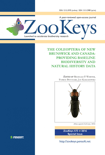
ZooKeys
Empowering Global Discourse in Zoological Sciences.ZooKeys, published by Pensoft Publishers, is a premier open access journal dedicated to all aspects of zoology and related biological disciplines. Since its inception in 2008, ZooKeys has emerged as a leading platform in the field, consistently showcasing groundbreaking research that spans diverse areas including animal science, ecology, and paleontology. With an impressive impact factor and categorized in the Q1 quartile for several categories such as Agricultural and Biological Sciences and Insect Science, the journal is recognized for its scholarly contributions, attracting researchers and professionals globally. Located in Sofia, Bulgaria, ZooKeys not only enhances the visibility of its publications through rigorous peer review but also ensures accessibility to vital findings, furthering academic discourse. As the journal continues to converge research efforts through 2024 and beyond, it remains an invaluable resource for students and academics aiming to stay at the forefront of zoological and ecological innovation.
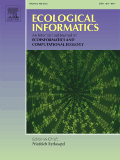
Ecological Informatics
Exploring innovative methodologies in ecological research.Ecological Informatics is a premier journal published by Elsevier, dedicated to advancing the interdisciplinary fields of ecology and informatics since its inception in 2006. With its ISSN 1574-9541 and E-ISSN 1878-0512, this Netherlands-based journal has established itself as a leading platform for high-quality research, reflected in its impressive Q1 rankings across multiple categories including Applied Mathematics, Computational Theory, Ecology, and Ecological Modeling, showcasing its critical role in shaping scientific discourse in these important domains. The journal ranks in the top percentiles for various fields: for instance, it stands at rank #26/635 in Applied Mathematics and #8/41 in Ecological Modeling according to Scopus. Though it currently does not offer open access options, its commitment to publishing impactful studies underscores its significance to researchers, professionals, and students interested in ecological and computational methodologies. Researchers in these fields are encouraged to explore and contribute to this respected journal as it continues to inspire innovative solutions for ecological challenges.
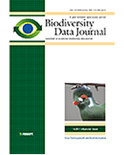
Biodiversity Data Journal
Fostering ecological understanding through innovative data sharing.Biodiversity Data Journal, published by PENSOFT PUBLISHERS, is a leading open-access platform that has been facilitating the dissemination of scientific knowledge since its inception in 2013. With a focus on enriching the fields of Agricultural and Biological Sciences, Animal Science and Zoology, Ecology, and Plant Science, this journal plays a pivotal role in promoting research outputs related to biodiversity, encompassing ecological data, species inventories, and conservation strategies. It has achieved commendable rankings in various categories, notably securing a Q2 rating in several key areas, indicating its growing influence within the academic community. The journal’s contribution to advancing the understanding of biodiversity is further enhanced by its commitment to open access, ensuring that vital research findings are widely accessible to researchers, professionals, and students worldwide. By publishing comprehensive datasets and innovative research, the Biodiversity Data Journal remains an essential resource for those looking to stay at the forefront of biodiversity science and environmental stewardship.

RUSSIAN JOURNAL OF ECOLOGY
Unveiling Insights into Russia's Diverse EcosystemsRUSSIAN JOURNAL OF ECOLOGY, published by PLEIADES PUBLISHING INC, stands as a critical resource within the field of ecology, offering an array of research insights that span various ecological topics. With an ISSN of 1067-4136 and an E-ISSN of 1608-3334, this journal has been consistently disseminating knowledge since its inception in 1996, now converging towards 2024. Despite its current Q4 ranking in the Ecology, Evolution, Behavior and Systematics category, the journal has carved out a niche in the publication landscape, particularly for scholars focused on the rich and diverse ecological phenomena of Russia and surrounding territories. The journal aims to foster interdisciplinary collaboration and innovation by providing a platform for the dissemination of high-quality research. While it currently lacks open access options, readers can expect in-depth studies and analytical discourses that contribute meaningfully to the global understanding of ecological systems. With an impressive Scopus rank, this journal remains an important outlet for researchers, professionals, and students committed to advancing ecological science.

ENVIRONMENTAL AND ECOLOGICAL STATISTICS
Empowering researchers with cutting-edge environmental statistics.ENVIRONMENTAL AND ECOLOGICAL STATISTICS, published by SPRINGER, stands as a premier journal dedicated to advancing the fields of environmental science and statistical methodologies. With an ISSN of 1352-8505 and an E-ISSN of 1573-3009, this journal has continually provided a platform for innovative research and interdisciplinary studies since its inception in 1994. Operating from the Netherlands, it enjoys a significant impact within the academic community, reflected in its impressive Q2 rankings across various categories including Environmental Science and Statistics. The journal maintains a strong focus on the application of statistical techniques to ecological and environmental problems, fostering an environment for discourse that is both robust and insightful. Although it does not currently offer open access, the depth and quality of research published within its pages position it as a vital resource for researchers, professionals, and students alike, eager to understand and address the complexities of environmental data analysis up to the year 2024.
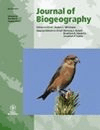
JOURNAL OF BIOGEOGRAPHY
Charting New Territories in Biogeography and EcologyJOURNAL OF BIOGEOGRAPHY, published by Wiley, stands as a premier multidisciplinary platform for the publication of high-quality research in the fields of biogeography and ecology. With an impressive Q1 ranking in both Ecology and Ecology, Evolution, Behavior and Systematics categories for 2023, this journal is recognized for its significant contribution to understanding ecological patterns and processes across geographic spaces. The journal, which has been in circulation since 1948 with a continuous production from 1979 to 2024, features rigorously peer-reviewed articles, critical reviews, and essential data that illuminate the dynamic interactions between organisms and their environments. While this journal does not currently offer open access options, it remains a valuable resource for researchers, professionals, and students seeking to explore the latest discoveries and theoretical advances in biogeography. With impressive Scopus rankings, including a 73rd position out of 721 in Agricultural and Biological Sciences and a 53rd position out of 461 in Environmental Science, the JOURNAL OF BIOGEOGRAPHY is indispensable for those aiming to advance their understanding of ecological frameworks and biodiversity conservation.
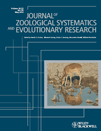
JOURNAL OF ZOOLOGICAL SYSTEMATICS AND EVOLUTIONARY RESEARCH
Pioneering Discoveries in Zoology and EcologyThe Journal of Zoological Systematics and Evolutionary Research, published by Wiley-Hindawi, stands as a premier academic journal since its establishment, showcasing cutting-edge research in the fields of Animal Science, Zoology, and Ecology. With an impressive track record spanning from 1963 to the present, this journal has earned a Q1 classification in both Animal Science and Ecology, as well as recognized rankings in Genetics and Molecular Biology. Its impact is highlighted by its Scopus ranks, placing it in the top percentile for relevant categories, underscoring its vital role in advancing knowledge and understanding within these disciplines. Researchers, professionals, and students will find a wealth of high-quality, peer-reviewed articles that contribute to the evolutionary understanding of biodiversity and systematics. Though not an Open Access journal, it remains accessible to a wide audience committed to exploring the intricacies of zoology and evolutionary biology.

Journal of Insect Biodiversity
Diving Deep into Insect Diversity and BehaviorJournal of Insect Biodiversity, published by MAGNOLIA PRESS in New Zealand, offers a vital platform for researchers and professionals interested in the intricate world of insect science. Established in 2019, this journal covers a wide array of topics within its field, focusing on the ecological, evolutionary, and behavioral aspects of insects, while also engaging with paleontological perspectives. With an impressive Q2 and Q3 categorization in multiple ecological disciplines and a growing influence in the Scopus rankings, it serves as an essential resource for scholars aiming to deepen their understanding of insect diversity and its implications for ecosystems. The journal is committed to open access, promoting the dissemination of knowledge without barriers. Researchers, students, and professionals alike will benefit from the timely contributions this journal offers as it continues to reflect the dynamic and evolving nature of insect research up to the year 2024.